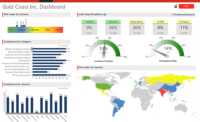In a globalized economy where most types of finished products include components or raw materials manufactured by third-party suppliers, the effective management of supply chain relationships is critical. Each party in the supply chain is dependent upon other supply chain parties performing their responsibilities. Where one party fails to perform its responsibilities, the consequences can cascade up and down the supply chain, creating legal exposure for other parties. Therefore, it is important for all supply chain parties (manufacturers, material and component suppliers, distributors and sellers) to develop and implement strategies to mitigate and manage supply chain risks.
The best place to start in evaluating and managing supply chain risk is to investigate and know the other supply chain parties through due diligence to ensure the other parties are reputable and capable of performing their obligations as promised. Where are they located? Can you sue them if there is a dispute? Are they located in a country where it is difficult to sue or enforce judgments?
The overarching objective of supply chain relationships is to have your risk exposure match your commercial involvement. This means a party should not assume liability exposure that could dwarf the profit created by the transaction or relationship. For example, a component supplier making a $1 profit on a widget should be reluctant to assume unlimited liability exposure for the upstream use of that widget, particularly where the use of the widget is outside of the supplier’s control. Otherwise, that supplier has essentially become the world’s cheapest insurer of the upstream parties.
Having robust and comprehensive contracts with your supply chain partners can go a long way to mitigating risk. You should have contracts with all your key partners. The contracts should set out the rights and obligations of the parties in a way that reasonably allocates risk among the parties. Contracts should include interlocking indemnity clauses up and down the supply chain to shift liability for losses and claims from the innocent party to the responsible party. Despite their importance, indemnity clauses are often poorly drafted, overly broad and misunderstood. Without good contracts and indemnities, supply chain parties may be at the mercy of the laws of foreign jurisdictions, fully exposed to liability caused by the fault of someone else and with little or no recourse against the responsible party.
Each party in the supply chain should also make sure it has appropriate and sufficient insurance coverage. Manufacturers and other supply chain parties often find themselves uninsured or underinsured in product liability claims and other supply chain disputes. Consumer and food product recalls and class actions, for example, can easily create liability exposure in the millions or tens of millions of dollars, so it is important to understand and insure for such risk.
Doing business with foreign parties poses particular challenges for domestic parties, as communication can be slow, gaining access to information and documents can be difficult and you may be exposed to foreign legal regimes outside the jurisdiction of Canadian and U.S. courts. All of these factors create increased risk for North American manufacturers. The best way to mitigate the risks of dealing with foreign parties is to secure “home court advantage” through choice of law, choice of forum (courts) and/or arbitration clauses in supply contracts. Even with these contractual provisions, some foreign companies may be judgment proof because they are located in unfriendly legal regimes and/or have no assets or insurance to pay judgments.
Lastly, parties in the supply chain must keep in mind that good recordkeeping will often make or break product defect claims. Having good and consistent internal manufacturing and quality control and recordkeeping processes will help you defend yourself in the event of a product problem. Additionally, parties should ensure that their commercial documents are in order. This means ensuring that contracts are properly executed, and that all insurance policies, contracts and commercial documents relating to the purchase and sale of any products, components or raw materials are organized and preserved.



